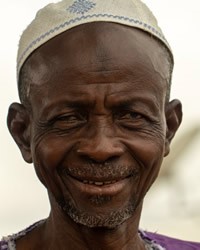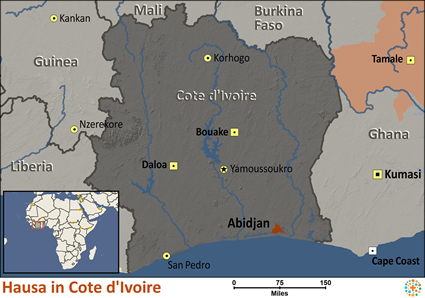The Hausa are originally from an area known as "Hausaland," a region covering 75,000 square miles and straddling the borders of Niger and Nigeria. The Hausa have migrated to Cote d'Ivoire over the last 200 to 300 years. Hausa traders, Muslim priests and Hausa-speaking slaves helped to spread the Hausa culture throughout Ivory Coast. Hausa became the language of Muslims and of trade. Still, the official language of Cote d'Ivoire, also known as "Ivory Coast," is French.
This is a very prominent people group throughout West Africa. They have their own clothing style, their own cuisine, and their language and culture dominates West Africa.
The Hausa are very industrious people and they do not tolerate idleness. In fact, they have been known to hold down several occupations at the same time, such as positions in the military, trade and commerce, social services, and in the spreading of Islam. They are known for being merchants who sell tie-dye clothing and leather goods. Others tend cattle or grow wheat, sorghum, millet, and maize.
The Hausa usually wear loose flowing gowns and trousers. The gowns have wide openings on both sides for ventilation. The trousers are loose at the top and center, but rather tight around the ankles. Leather sandals and turbans are also typical. For casual wear, a taggo (long jumper) may replace the big gown, and they might wear a plain cap instead of a turban.
The early Hausa priests and traders influenced many non-Hausa in West Africa to adopt this style of dress. They wanted to be associated with the privileged group of people who enjoyed access to kings and wealthy people. Today, however, more and more people wear European style clothing.
Their society has always been very patrilineal, which meant that the line of descent was through the father's side of the family. Hausas tend to marry cousins and distant relatives. Hausa women are given less educational opportunities than men. Women are often confined to the home, except for visits to relatives, ceremonies and the workplace. They are primarily responsible for tending to the children and doing household chores. This includes providing the water and fuel needed for cooking. In addition, they are expected to invest the rest of their time in some type of trade. The money they earn is used in financing their daughters' dowries.
Some have wrongly assumed that Boko Haram comes from the Hausa because the term itself is from the Hausa language. But Boko Haram is mainly from the Kanuri and Fulani tribes.
The Hausa of Cote d'Ivoire are virtually all Muslim. They identify with Islam, but many of their religious practices have been mixed with local traditions. For example, they believe in a variety of spirits, both good and bad. Traditional rituals include making sacrificial offerings to the spirits. Family members perform most rituals, but they call upon specialists to cure diseases. They believe their priest, or malams, have the best charms. According to the malams, different magical formulas have different effects. The priests claim to have cures for every aspect of human desire or concern. The malams are welcomed guests among Hausa people because they believe that the priests' prayers will be answered.
Adequate Christian resources are available in the Hausa language; but they are still an unreached Muslim people group. They need to see past their worldly success and see that they will not be accepted by the Creator of the universe except through Jesus.
Pray that Hausa people who know Christ will become wise in sowing the word of God among their families and friends.
Pray for Jesus movements to infiltrate extended families so the gospel will spread rapidly among every Hausa community in Cote d'Ivoire.
Pray for the Holy Spirit to give the Hausa people teachable and understanding hearts.
Pray for a strong movement of the Holy Spirit will bring entire Hausa families into a rich experience of God's blessing.
Scripture Prayers for the Hausa in Côte d'Ivoire.
| Profile Source: Joshua Project |


























